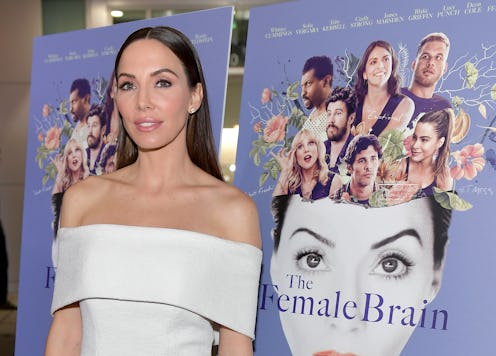Entertainment
The Infuriating Way Hollywood Movie Sets Are Designed To Make Life Harder For Women

Whitney Cummings is fed up — with the way Hollywood treats women, and in particular, the way the it treats female directors who have children. While the entertainment industry may be working hard to get more women behind the camera, Cummings wants to make sure that they can also pursue their familial desires, should children be a part of their life goals. Movie sets aren't designed for mothers, the director of the new movie The Female Brain says, and it makes life harder fo women everywhere.
"I worry that women, when they start getting offered these projects, that they have to turn them down because the environment of making a movie is not conducive to having a young child or being pregnant," Cummings tells me when we chat over the phone. Though she's not a mom herself, the filmmaker thinks mothers, in theory, are perfectly suited to running a movie set. "After directing a movie, I really believe no one is more qualified to direct a movie than a mother," she explains. "You’re basically running around like solving emotional problems all day and trying to get people to stop crying and stop fighting."
Yet in reality, few moms can take the time off away from their kid (sometimes as much as a year) in order to direct a film, and movie sets often don't have space for moms to breastfeed or get childcare. "Right now, it's very much built on a man with a woman at home taking care of the kids," Cummings says. It's one thing to say, "Let's hire more women to direct," she adds, but you also have to actually make it possible for them to work. "How are we going to take care of them so we can keep them in these jobs and they don't say, 'Screw this, I'm never going to direct again'?"
When filming The Female Brain, her directorial debut, Cummings says she was concerned about how the women on set would be treated. "The way this movie was shot, it was so intense that I always get worried that, when women get offered these jobs, they're not going to be able to say yes," the director says. "That these projects can't accommodate the lifestyle of being a mother."
Cummings says she had to take a long, hard look at her own wants and desires when taking on The Female Brain, a relationship comedy which she also co-wrote and stars in. After all, not only is the movie Cummings' debut, but it's just one of many projects she has going on right now. There's an HBO standup comedy special, guest-starring roles in a a number of comedies, and her job executive producing the upcoming reboot of Roseanne.
"By the time I was actually ready to direct a movie, I was like, well my body is running out of time. I'm 35 years old. My body is going to start betraying me, then that's going to be my problem," Cummings recalls. Knowing that making her movie would be a long and demanding process, she chose to freeze her eggs. "But that's expensive and that has to be available to everyone," she says now. "And covered by health insurance. That's one of those ancillary issues that really needs to be addressed."
Having to put motherhood on hold was one reason why Cummings was was initially hesitant to direct the film, which, coincidentally, tackles how women express their wants and needs. The story is based on a scientific non-fiction book of the same name by Louann Brizendine, which explores the chemical reasons behind the differences between male and female brains. Cummings describes the film as a sort of half movie, half TED Talk.
"I wanted to create the feeling for people that we got when we read the book, which was kind of relief and freedom," Cummings explains. There was something very liberating." The book and movie both tackle how women are often labelled as emotional, hyper-vigilant, obsessive, and, worst of all, crazy. "All these so-called negative words that are used to describe traditionally female characteristics, in the book they were actually framed as strengths and kind of superpowers," the director adds.
Cummings wanted to challenge typical notions that women are one way and men are another. "There’s just this thing where people say women are crazy and that’s just OK, that women are psychos and men are stupid and all men are the same," she says, adding that she's lost a lot of sleep by worrying about stereotypes that hurt her feelings. Not to mention the actual filming process; "It's really really challenging," Cummings says about directing, with a laugh. "And I think that we’re in this amazing moment where the tectonic plates are shifting in our business and I’m so excited that so many more women are directing and are wearing more hats, but for me, personally, I think I do better when I just wear one or two hats instead of three or four."
That may be the case, but if Cummings decides to keep wearing more and more hats, perhaps Hollywood will end up a more fair and balanced place for all women hoping to work on movie sets.
This story was created in support of Bustle's 2018 Awards Season pledge. Read more here.